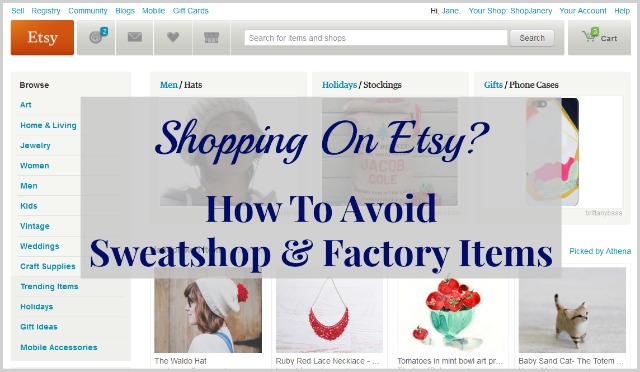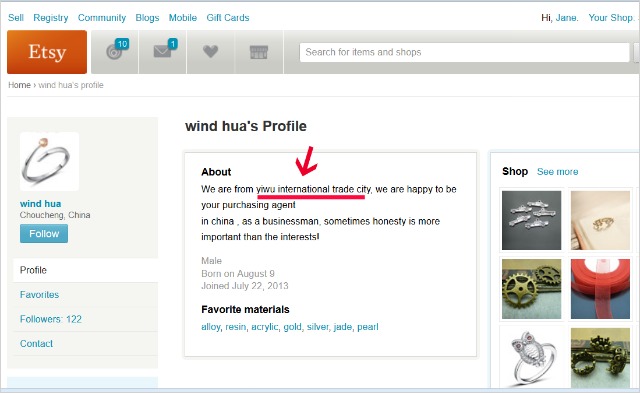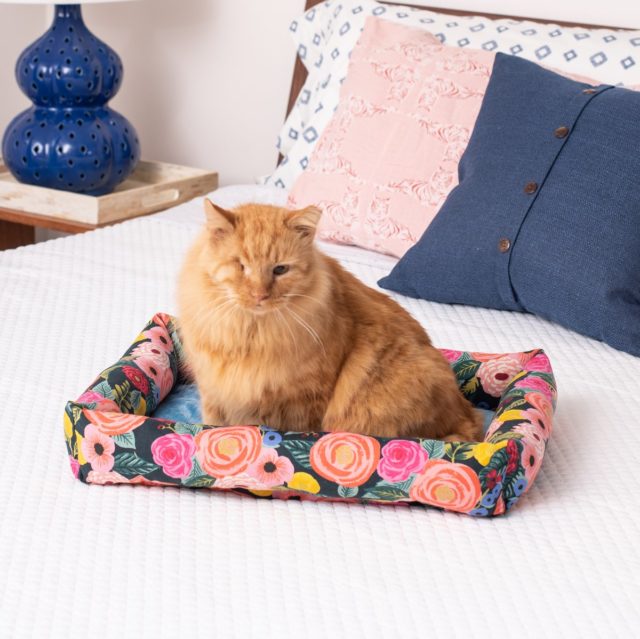If you love Etsy but don’t know that some sellers are offering sweatshop and/or Made in China goods, then this post is for you.

Etsy is a great marketplace for handmade and unique products. I love shopping on the site; it’s made it so easy to support individual artists and small businesses. Unfortunately, factories and made-in-China resellers* have flooded Etsy, making it harder to find truly handmade products.
*Resellers are people who buy factory products wholesale and then re-sell them on Etsy, masquerading as a “handmade” business.
I’ve seen it firsthand in the purses and handbags category as well as in the jewelry and clothing markets. For example, this Infinity Ring is for sale in multiple Etsy shops – like this and this. It can also be bought for $1.20 on the website Alibaba, which is basically a wholesalers marketplace for factory-produced goods and knockoffs.
There’s a couple downsides to this:
1. It is hurting the integrity of Etsy as a handmade shopping destination. Some artists who have used it for years are migrating to other platforms out of frustration.
2. The low prices offered by resellers make it hard for true handmade sellers to compete. When consumers see cheap goods, they then think the artists’ more expensive creations aren’t worth the price charged by the artist.
3. It may end up driving consumers away from Etsy, if they are disappointed when they receive a clearly not handmade product in the mail.
Here are the guidelines I follow in order to try to avoid supporting a reseller or an overseas sweatshop when shopping on Etsy:
1. Check the company’s “about” page and see what they say. Often their “about me” section is stilted and short, or sounds insincere.

This example doesn’t even try to sound handmade, in fact they mention their location in Yiwu, a huge factory city in China. It reads “We are from yiwu international trade city, we are happy to be your purchasing agent in china”
2. Check where the seller is located. This info is in the left sidebar below their name in the image above. As a rule, if a seller is located anywhere in Asia, I won’t buy from them. Yes, I know I could be excluding some true artists, but my main purpose in using Etsy is to purchase from local – i.e. American – artists.
3. Check how many items the seller has listed. I’ve seen some California-based sellers with thousands of “hand sewn” products. Sorry, but no artist can sew thousands of unique products at once. Also, the Los Angeles area has a problem with illegal sweatshops too.
4. Is the price too good to be true? Remember that items that are handmade will cost more than items at Target. If something seems to good to be true ($5 leggings?) – it’s probably not handmade. Unless the seller undervalues their merchandise.
I know I’ve made some serious generalizations above, but I just wanted to share the ways that I personally try to make sure the artists I buy from are genuine.
Just being aware that resellers are out there is a good start. Trust you gut and use your judgement.
Whatever you do – please keep shopping on Etsy to support the great artists that are on there!!




9 Comments
I’d also like to add that on Etsy you can shop by location. I often search for artisans and crafters in my own hometown. It’s easy to check their credibility and grow my network within my own community.
Great point! I didn’t think to include that part . . . I was writing this post at 6 am this morning. Thanks!!
I’ve been looking around on Etsy for personalized mommy necklaces, and many of them are either not handmade or handmade but somewhat cheap looking.
It’s taken a bit of searching to find reasonably priced and handmade items on Etsy now. I’m actually shocked at the amount of vendors I’m finding from China.
Yeah, it’s really disturbing just how many there are. FYI, I really like The Vintage Pearl (not on Etsy) for handmade / US made personalized necklaces. Ryan gave me one a few years ago. Also Lisa Leonard, of course.
This is great! Too often people think “Oh, it’s from Etsy, so it must be handmade by some individual.” It’s a wonderful reminder to always look for where it’s coming from and who is making it.
Wow, thanks for this post. I had no idea that was happening on the site. I’ll definitely be more vigilant. I wonder if Etsy is doing anything or able to do anything about these vendors taking advantage of the site.
i’m glad you’re talking about this!! i have totally noticed the influx of wholesalers and it’s so very very disappointing. i hope that etsy finds away to vet these guys out, totally damages the integrity of the site.
I recently opened up an Etsy store and within 24 hours was contacted by the integrity team – some fictitious person named “Laura”
I listed 1 item and planned on doing the rest later. It was for handmade leather sandals (women’s shoes)
Anyway, to make a long story short, first of all, she said that the images I used were stockphotos. They were not. I asked why she thought that but she ignored my question. Then she further asked about my workshop and required me to take photos of the tools used with my shop name in a piece of paper next to everything.
You see, I do this business on the side and work with a ODM (Original Design Manufacturer) leather workshop, not a factory, to come up with our final designs and products. This is a small workshop with a capacity of creating only a few pairs per week. So, it’s not my own workshop.
This having been-said, I don’t create the product with my own hands – the craftsman does this, but, the creative process of design – is where I am primarily involved in, which also includes aesthetics and selection of materials/ colors and validation of quality.
Anyway, so apart from being rude, this Lauren person was not following up after 2 days. I emailed in a couple of times to ask what the verdict was – if I could or could not list on Etsy. I was not willing to spend any upfront/ additional costs to create additional banners and images just to comply with their policies and in the end, wound up with nothing.
She responded and said that ‘obviously, you, the seller, does not participate in the design nor the creation of the items’ – even after I explained the ODM process and what’s involved in it.
I further inquired, out of curiosity, whether ALL items on Etsy are handmade and the response I got was to the tune of ‘just because other sellers violate our policies, doesn’t mean you should, too.’ – I was appalled. Because quite simply, I was just asking whether Etsy is for handmade items only.
Also, if the listing I created was in the wrong category (under handmade), and if not ALL items on Etsy are handmade, then it could be as easy as correcting the listing, right?
Well, WRONG.
Sarcasm, rudeness and unprofessional responses is what I got. I can respect their decision not to let me list, even though there are countless of China factories that list on Etsy that violate their so called ‘Integrity’ policy.
When I asked about the screening process, I was ignored a few times until finally, I got the ‘just because other sellers violate our policies, doesn’t mean you should, too.’ response.
So, when it all comes down, Etsy, I believe, allows some rogue sellers to be on their site for the simple reason that they want more revenue. It’s not about integrity at all. Their screening processes are based on chance and Lauren’s – or whatever her name is’ mood.
It’s a shame.
[…] “As a rule, if a seller is located anywhere in Asia, I won’t buy from them.” […]